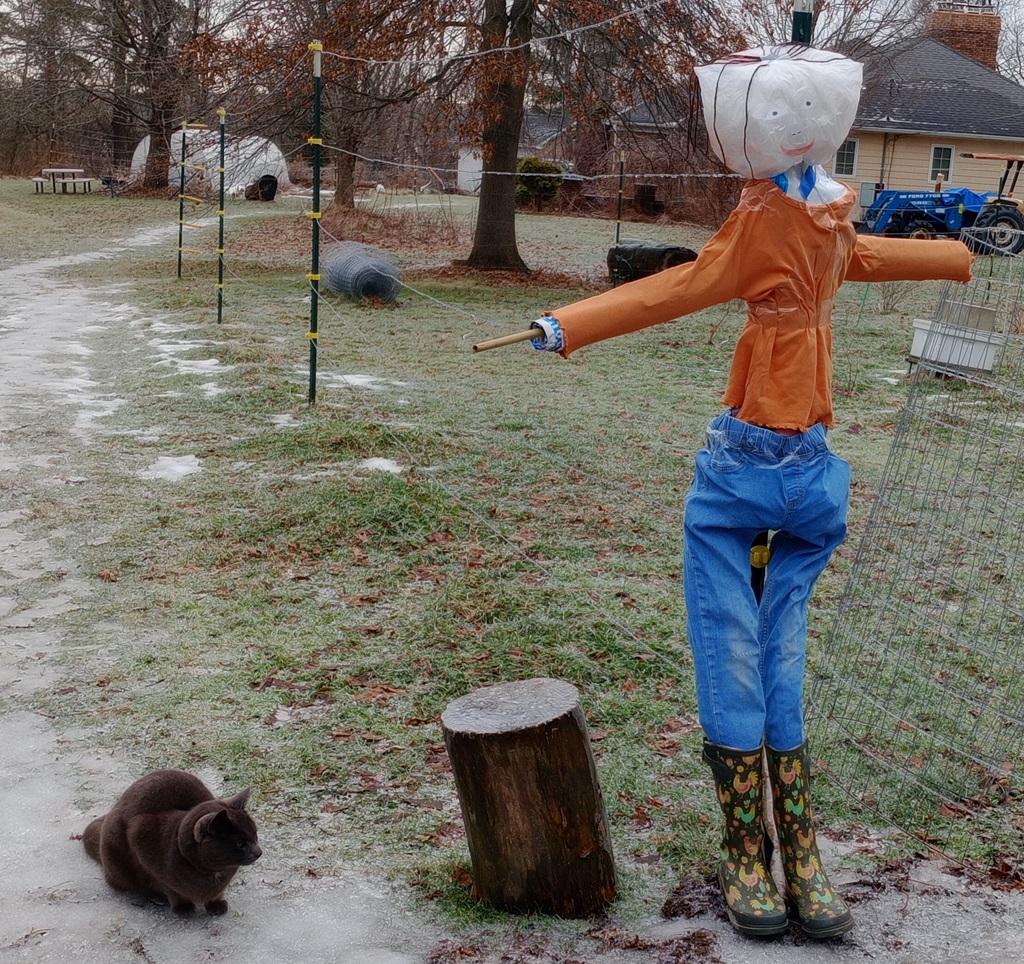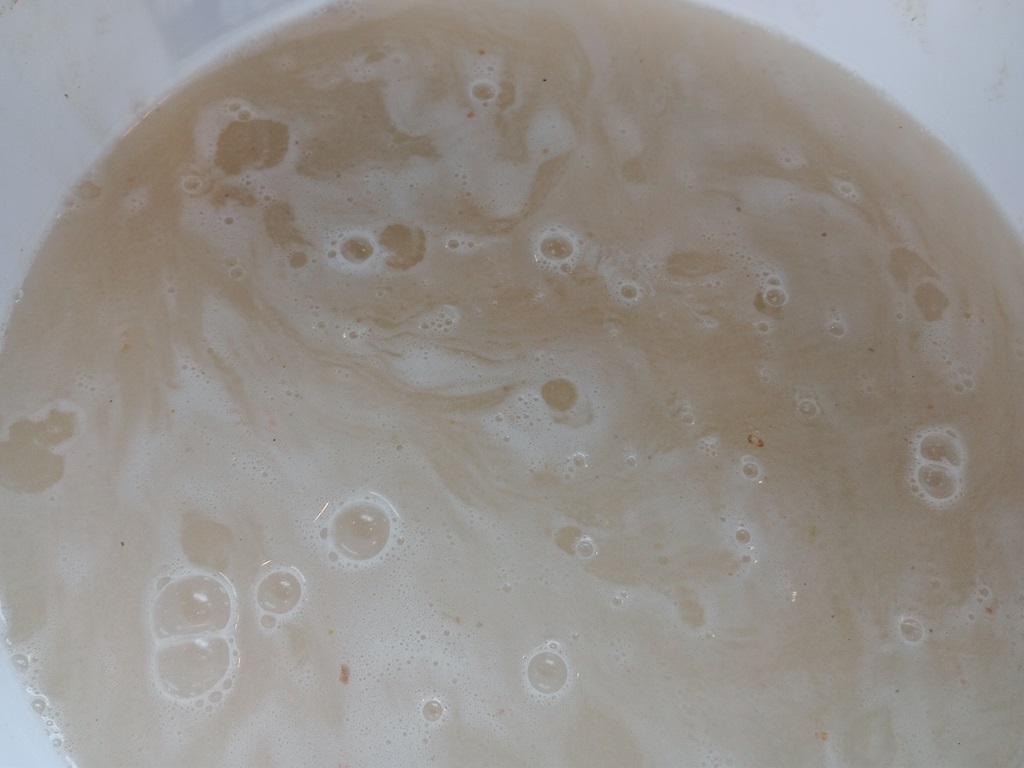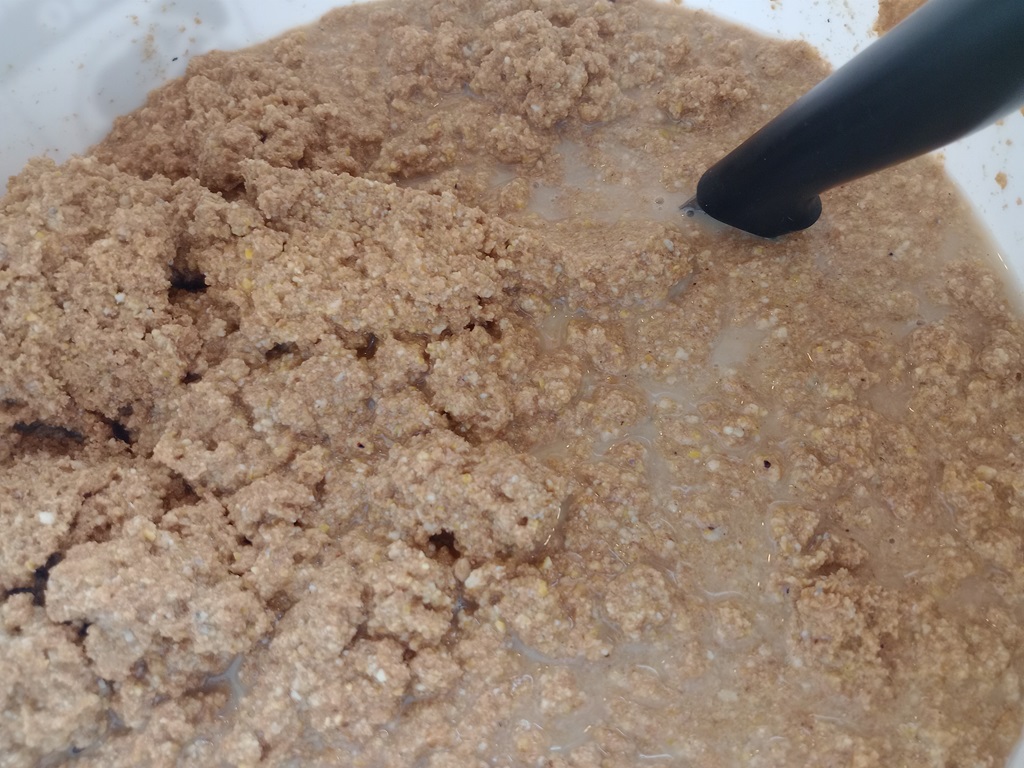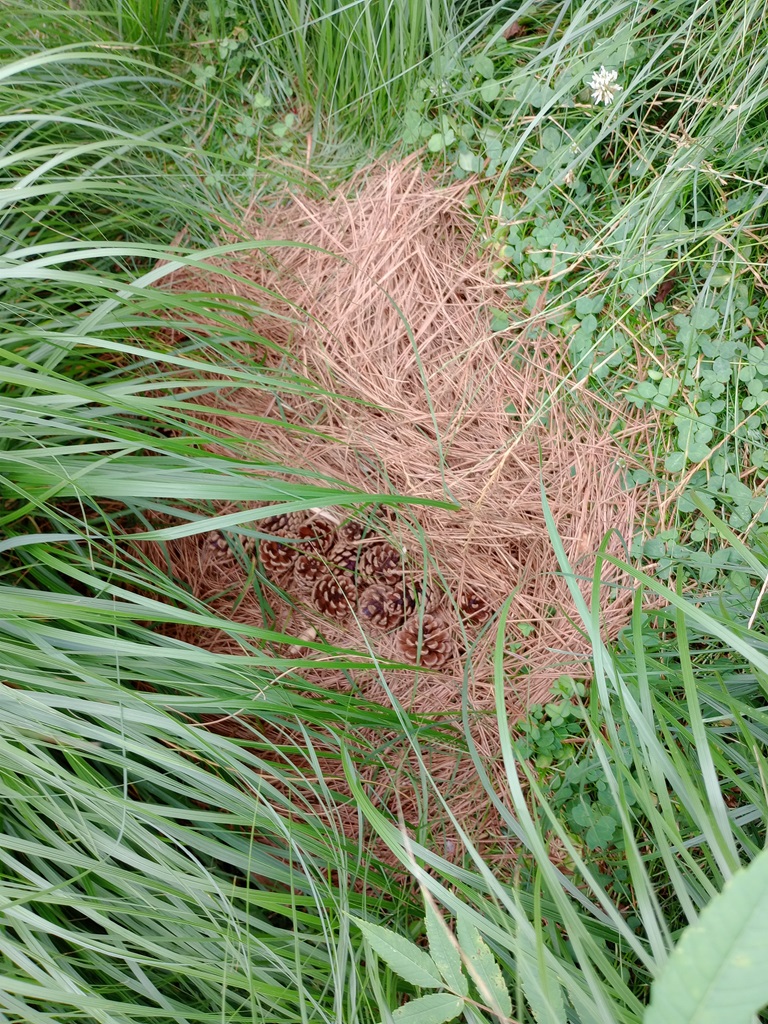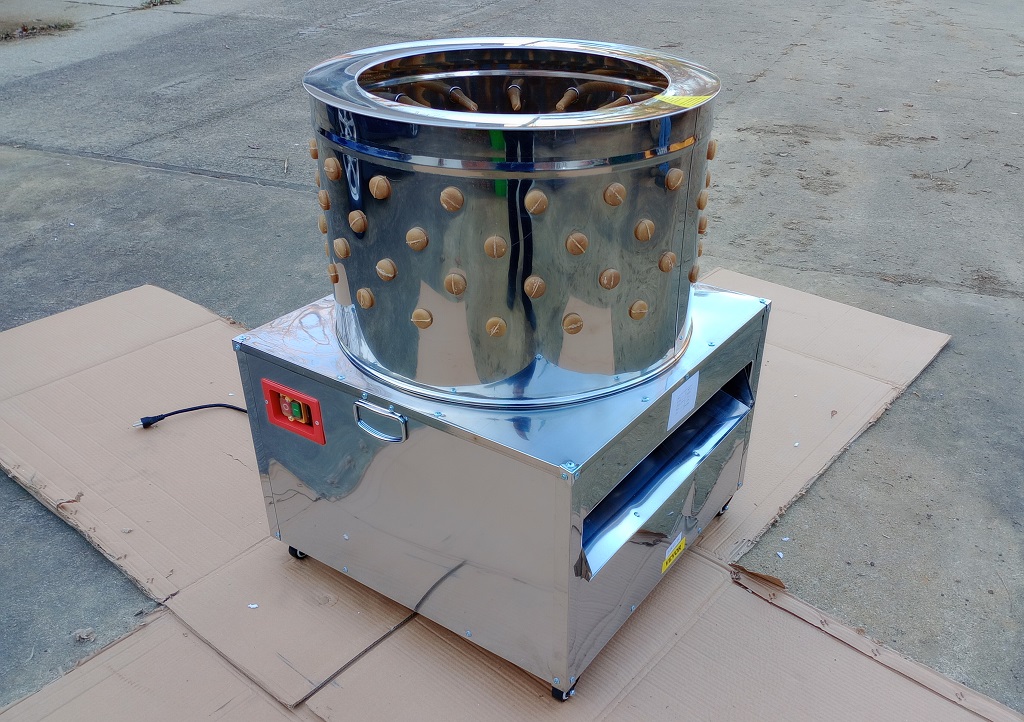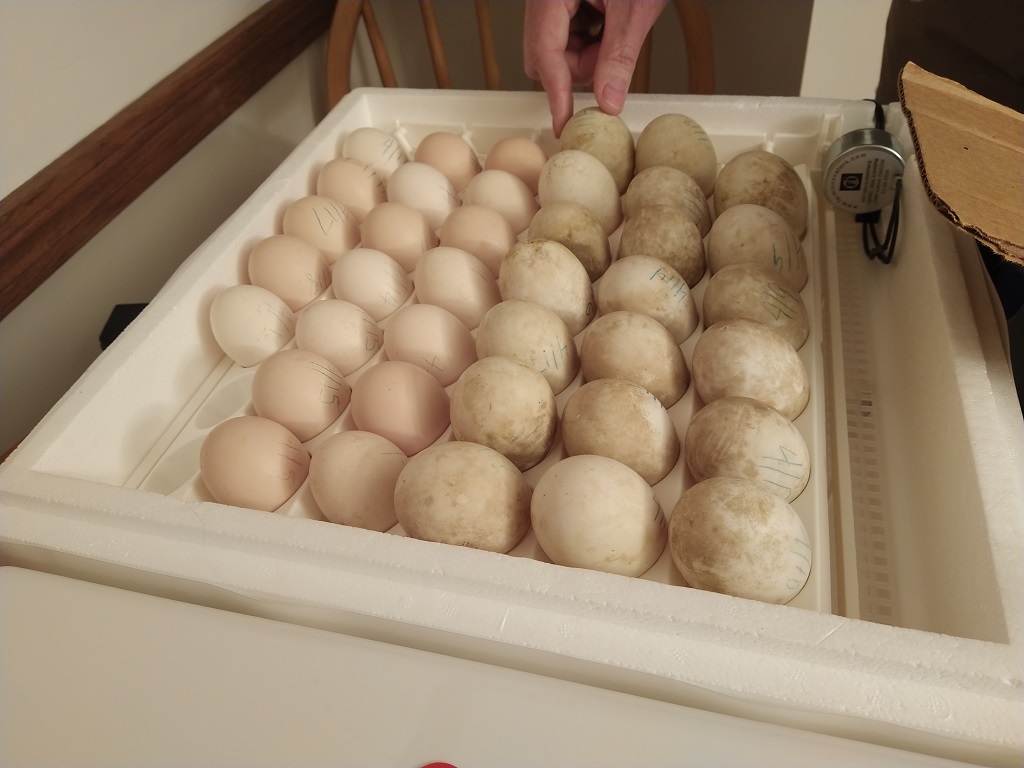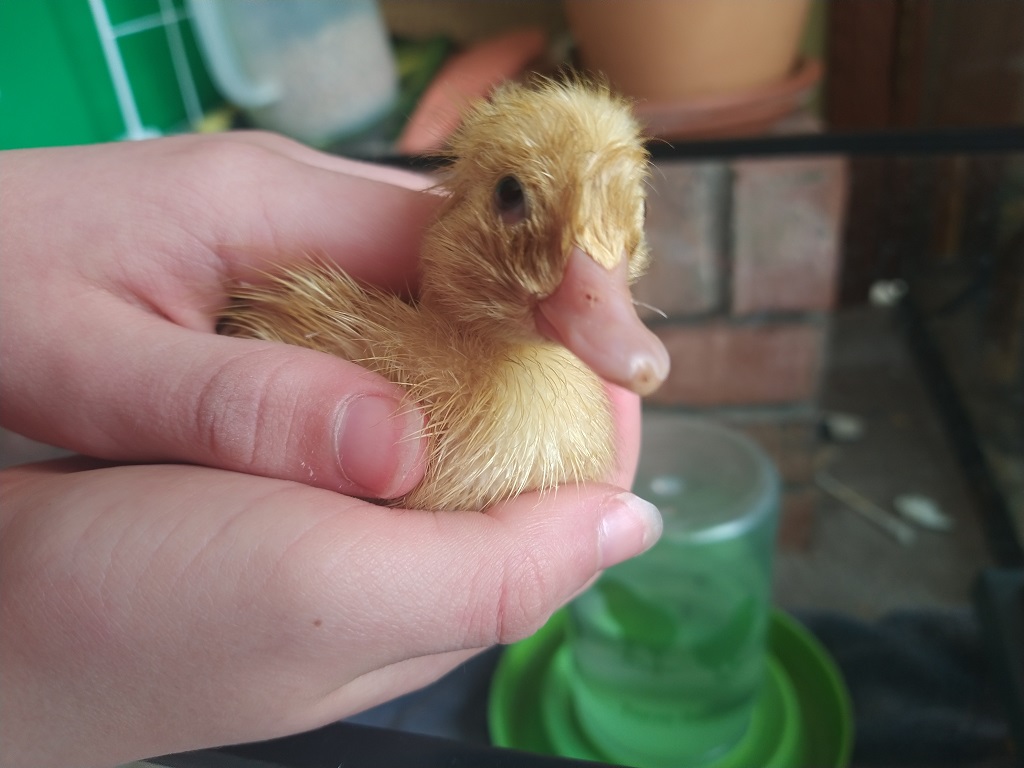I’m not sure if it is because the winter has been particularly cold or the local lake is drained and the ecosystem is disrupted … but we’ve never had a problem with hawks and eagles until this year. For most of the year, the buzzards keep them away. But this month! We lost a duck to a hawk — I came around the corner and saw the thing eating a duck. A week or so later, two ducks were missing and big feathery spots were in the duck yard. We put a small radio tuned to a talk station out in the duck yard — which seems to have helped there, but we lost two chickens today. I think a rooster tried to rescue the hen and was taken out. So Anya spent the day making scarecrows for both the duck and chicken yard. I mounted old CDs around the fence.
Category: Ducks
Overnight Fermented Chicken Feed
I constantly read how awesome it is to ferment the chicken feed — except we’ve got a lot of birds, and it is cold outside (or hot) much of the year. So we would need a row of five-gallon buckets inside the house to manage the approaches I’ve seen where the feed sits and ferments for three to five days before it is used. I was curious how much fermentation you could get in 24-hours if you had some starter. So I took a scoop of chicken feed into the house & added a bunch of water. I let it sit on my nice, warm countertop for a few days. Then I put a day of food into a five gallon bucket & added my starter. Poured water over the whole lot of it & let the one bucket sit until I was going to feed the chickens the next morning.
Result? It’s got a nice sour/sweet aroma, was bubbling happily, and was well hydrated. The birds love the chicken food mash anyway, and a nice bucket of 70 degree mash on a cold winter day seemed like a nice treat even if the fermentation hadn’t gone anywhere. But it worked! I pull about a quart of the fermented feed to use as a starter, bring the bucket out to feed the birds, add more pellets to my empty bucket, pour the starter in, and cover it all with water until tomorrow when I do the same thing all over again.
Nesting Instinct — Duck Edition
One of our Pekin ducks has gone broody — but people have managed to sufficiently breed out brooding instinct to what I call “short attention span nesting”. She absolutely needs to sit on a nest. For about 20 minutes, then she’s ready for a swim in the pond or some chow. Which means we wouldn’t trust them to hatch eggs — we’ve got incubators for that. She has, however, figured out a reasonable solution: pinecones. No one takes them from her .She can even leave them out in the yard overnight and the marauding racoon will leave it alone. She built a very convincing nest in our pine trees (and was frantically trying to escape the fence to go sit on the nest) … so Anya relocated it into the duck yard and got the duck over to it. Now she’s got a nest inside the fence to sit on for half an hour and doesn’t seem so compelled to escape.
Chicken Plucker
We got a chicken plucker for processing birds this year — the metal on the base is really thin, the motor appears to have come pre-rusted, and they somehow consistently put one of the rubber sticks in upside down (although, after using it, we think this might be intentional and kind of “sweep” the feathers from underneath out the shoot).
We have been very hesitant to buy one of these — they are expensive. But it takes us so much time to butcher birds. I see videos on YouTube of people plucking a bird in five minutes. That’s not us. At first, I thought maybe it was a “get better with practice” sort of thing. Or that we weren’t scalding enough. Or that we were doing something else wrong. But it’s been years. We’re not getting much quicker, the scald is fine, and the only thing we might be doing wrong is being too picky about what constitutes “plucked”.
The biggest hurdle was that we couldn’t really see one work to determine if we’d be done defeathering in a minute or if we’d still be spending half an hour plucking feathers. There wasn’t a good way to find out, though. People post videos online, but they also post videos of themselves plucking a bird in a few minutes. So that’s not really trustworthy. We finally decided to just spend money and buy a plucker. They work! There may be a few big wing feathers to pull. There may be a few smaller feathers near the feet. But the bird was plucked within a few minutes. It takes me about fifteen minutes to butcher a bird, and Scott was able to get a bird to the “ready to be butchered” point in fifteen minutes (that includes walking across the yard twice). This is such a huge difference — we were able to process all of our turkeys in a single day. It wouldn’t be a short day, there’s a good hour or two to clean everything up once we’re done. But it’s done in a day. And the birds were plucked very well.
Happy February — and duck eggs
Happy February! We got our first duck eggs yesterday — I wasn’t expecting them to be laying again so soon. Anya and I took a break after lunch to cut dried grasses for the ducks’ bedding. As we opened the coop to put in the new bedding, there were two duck eggs in the farthest, darkest corner of the coop.
Ducks are starting to hatch!
One duck egg started pipping yesterday (really early!), but didn’t make it out of the egg. A second egg pipped this morning and we had a little duckling in the incubator by the afternoon.
Duck and Turkey Milestones
We no longer have 22 tiny birds in the house! Stream (the new duckling) spent Monday night outside in the duck coop. We’ve been letting the little one out into the duck yard to hang out and get used to each other, but bringing it into the house at night. I got up at 6-something on Tuesday morning to make sure the little guy was OK and the ducks are now hanging out together in the yard. It was cold — mid 50’s — when I let them out of the coop this morning, and they all were napping next to the pond in the sunshine. The little one was sleeping right next to one of the big ducks.
Then, in the evening, we put the turkeys into the pasture with the big turkeys and chickens. They’ve been hanging out in the baby tractor next to the pasture, so everyone has had a chance to get used to each other. The little turkeys can fly really well — on Monday, Anya got sidetracked bringing the turkeys into the house. She left two thirds of the turkeys in the baby tractor with the zipper open! I noticed the chickens and turkeys were not in the coop, and I walked over to let them in. All of a sudden, this dark shadow comes flying at me … literally, it was a baby turkey who flew some twenty feet and cleared my shoulder. Since they were able to fly themselves out of the pasture, we trimmed feathers on their left wings. Now they look a little asymmetrical, but they mostly stay inside the pasture. Unfortunately, the mesh isn’t small enough and they can pop themselves out of the fencing.
The turkey farm where we picked up four turkeys last year — the owner said the male turkeys take turns sitting on the nest and taking care of the baby guys. I totally believe that after seeing how the big turkeys are with the little ones. They puff up and circle around the gaggle of baby turkeys. When the babies split out into multiple groups, the two big turkeys kind of round them up into two groups and each watch over his group. Anya says they even tuck the little ones around them to sleep.
Proto-chickens and Proto-ducks — 8 days later
Scott and Anya candled all of the eggs tonight — of the 41 eggs, there are three that might not be developing. But all of the eggs are still in the incubator because there weren’t any obviously undeveloped eggs. If all of these eggs hatch, we’re going to have an absolute swarm of baby birds!
